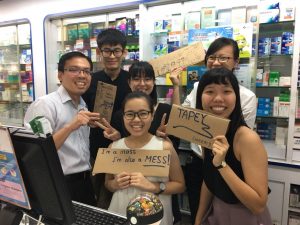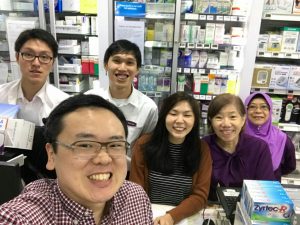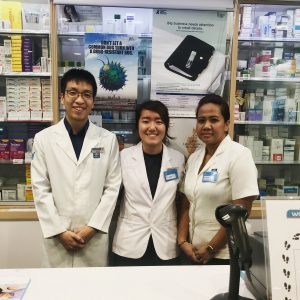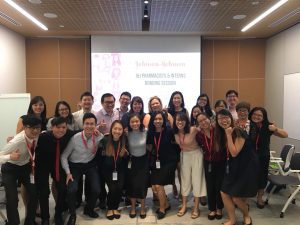Pharmacy textbook comes alive
Background
Pre-employment Clinical Training (PECT) is a 6-month internship (comprising of two 12-weeks attachments) for Year 4 students held in a wide array of training sites such as community pharmacies, polyclinics, community hospitals, pharmaceutical companies and Health Sciences Authority, a regulatory agency. The experiential learning is one of the key enhancement to the new curriculum implemented since 2014 (http://news.nus.edu.sg/press-releases/nus-enhances-pharmacy-curriculum-meet-future-challenges-singapore-healthcare). The 6-month internship also contributes towards the 12-month pre-registration training required for one to be qualified as a registered pharmacist in Singapore.
In this article, we would like to share how the experience has given us a flavour of the multi-faceted roles of a pharmacist and provided insights on establishing our future professional careers.
Insights from students who precepted at community care sites:
Community care, being a clinical rotation, gave us a sneak peek of the long journey ahead of us. The most daunting aspect of community care was undoubtedly patient interactions. Most of us were first-timers when it came to handling patients’ queries or prescriptions. While the rigorous Pharmacy curriculum laid our clinical foundation knowledge and provided skills training through modules such as Pharmacotherapeutics, Self-Care and Pharmacy Professional Development Skills, in order to apply it effectively and safely on our patients, we had to use beyond what was taught in school, such as intuition and common sense. The transition from school to clinical practice was difficult yet fulfilling, as we had caring preceptors to help us improve. This rotation helped us understand our strengths and weaknesses, facilitating our independent learning throughout the professional career.
Insights from students who precepted at pharmaceutical companies:
Back in school, we were introduced to the drug product life cycle and its management from cradle to grave, as well as the regulatory science behind the industry. Through the industrial rotation, we were able to witness the role of the pharmaceutical industry in the provision of healthcare and how direct and indirect patient care blend seamlessly to care for patients. In particular, we understood how drugs are developed, how clinical trials provide efficacy and safety data, how regulatory affairs use efficacy and safety data for product registration, how marketeers ensure access into local markets, and how sales representatives ensure that patients can access drugs that they need.
All in all, through the work of our seniors in the industry, we now understand the value and potential of pharmacists in the pharmaceutical industry involved in the processes mentioned above. Practising pharmacists will then take over, using their clinical judgment and marketed drugs to provide pharmaceutical care.
Closing remarks
There is an immeasurable amount of knowledge and skills to be learned throughout our professional career. The PECT experience gave us a broad overview on what to expect as we grow as a healthcare professional and reinforced teachings from our undergraduate curriculum. We had the chance to see our “pharmacy textbook come alive”.
Some words of encouragement and advice from seniors to juniors:
During the 3 months of community care attachment, it is likely that you would face a lot of challenges overcoming the barrier of transitioning to practice. The school only prepare you to learn, so stay focused and progressively work on your own weaknesses. Be acceptive towards criticisms, changes and enjoy the process!
By Chew Qing Bin (Precepted at Guardian Pharmacy under Mr. Alvin Ong, May – Aug 2018)
When you embark on your rotation at the pharmaceutical company, there is bound to be steep learning curves. Hence, it is important to go in with an open-mind and willingness to learn. Take responsibility in your own learning by looking up on things that you are unsure of or ask others for help if necessary. Never take criticisms personally but instead take it as an opportunity to improve on yourself. Life is a never-ending learning process, and we should be humble to learn from others so as to constantly improve on ourselves.
By Toh Ting Fu (Precepted at GlaxoSmithKline) under Ms. Leow Kwee Foong, May – Aug 2018)
My PECT rotation with Zuellig Pharma allowed me to put into practice the things I learn (especially Pharm Law!) and to apply them in real situations, as well as picking up various hard and soft skills, which to me is invaluable experience gained outside of regular curriculum. My advice would be to most importantly keep an open mind, try to understand the purpose and rationale behind the things you do, as well as to take initiative and be enthusiastic about learning.
By Eng Min Hao (Precepted at Zuellig Pharma) under Ms. Shermain Ng, Aug – Nov 2018)
Be prepared to learn and do things very much different from what the school has taught you. Much of the learning comes from self-discipline and your own initiative.
By Yeo Zhi Jie (Precepted at Pharma to Market) under Ms. Joelle Chia, May to Aug 2018)

Photo contributed by Lee Hui
(Class of ‘19, precepted at Guardian Pharmacy)

Photo contributed by Nyiau Wen Jun
(Class of ’19, precepted at Unity Pharmacy)

Photo contributed by Grace Bu Yueyang
(Class of ‘19, precepted at Watson’s Pharmacy)

Photo contributed by Judith Lim Han
(Class of ’19, precepted at Johnson & Johnson)

Photo contributed by Toh Ting Fu
(Class of ’19, precepted at GlaxoSmithKline,
Pharmaceutical Division, Regulatory Affairs)
Article written by Chew Qing Bin (Class of ’19, precepted at Guardian Pharmacy), Loo Yan Qi (Class of ’19, precepted at Gurdian Pharmacy), Sarah Xing Huiwen (Class of ’19, precepted at Johnson & Johnson), and Toh Ting Fu (Class of ’19, precepted at GlaxoSmithKline)
